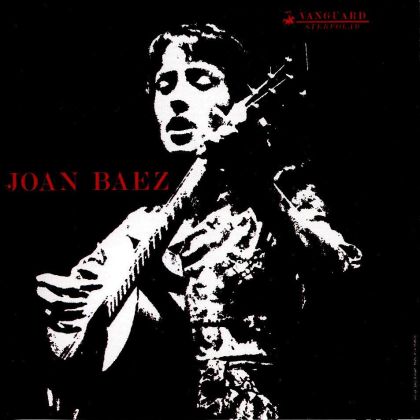Notes
Originally Released 1960
Remastered Edition Released August 14, 2001
AMG EXPERT REVIEW: At the time of its release, Joan Baez's debut album
was something of a revelation. The folk music revival was beginning to
gather steam, stoked on the popular side by artists such as the Kingston
Trio and the Easy Riders, as well as up-and-coming ensembles such as the
Highwaymen, and on the more intense and serious side by the Weavers. The
female singers on the scene were mostly old-time, veteran activist types
like Ronnie Gilbert and Malvina Reynolds, who was in her 60s. And then
along comes this album, by a 19-year-old who looked more like the kind
of coed every mother dreamt her son would come home with, displaying a
voice from heaven, a soprano so pure and beguiling that the mere act of
listening to her - forget what she was singing - was a pleasure. Baez's
first album, made up primarily of traditional songs (including a startling
version of "House of the Rising Sun"), was beguiling enough to woo even
conservative-leaning listeners. Accompanied by the Weavers ' Fred Hellerman
and a pair of session singers, Baez gives a fine account of the most reserved
and least confrontational aspects of the folk revival, presenting a brace
of traditional songs (most notably "East Virginia" and "Mary Hamilton")
with an urgency and sincerity that makes the listener feel as though they
were being sung for the first time, and opening with a song that was to
become her signature piece for many years, "Silver Dagger." The recording
was notable at the time for its purity of sound, but like a lot of Vanguard
CD's issued in the 1980's, needed a serious remastering job, which it finally
got in 2001, some 41 years after its original release -- gone are most
of the hiss and background noise that marred the original CD, and Baez's
voice soars with an awesome purity of "Fare Thee Well", "House of the Rising
Sun", and "All My Trials", and the gutiar acompaniment on "Wildwood Flower",
among other tracks, comes through with greater richness and clarity. The
album has also been augmented with the presence of three bonus tracks:
"Girl of Constant Sorrow" and "I Know You Rider", which are as good as
anything on the original LP, and the uncut version of "John Riley" (which
also appears in its original shortened form) with its complete complement
of verses. Nicely packaged and annotated, the August 2001 reissue CD is
the way to hear and own this album. -- Bruce Eder
Amazon.com essential recording
History's ear hasn't been kind to Joan Baez: in retrospect, set against
the traditional voices whose material she interpreted, her own versions
seem painfully pretty, her soprano icy and removed. But it's hard to gauge
now the force of her first record, a folk-revival landmark. Released in
1960 after a triumphant Newport Festival appearance, the record had deep
material and emotion that few of her urban folk contemporaries possessed.
Her version of "John Riley" is compelling, "East Virginia" glowing, and
"Silver Dagger" concentrated, while "Preso Numero Nueve" showed her future
political turn. (This 2001 reissue offers two previously unreleased tracks
plus an expanded version of "John Riley.") --Roy Kasten
Amazon.com Customer Review
Talent and Integrity, October 9, 2001
Reviewer: Mark R. Thivierge from Brighton, MA United States
It's nearly impossible to overestimate the importance of this album. To
fully appreciate its impact, one must appreciate how things were 1960 when
women artists were expected to simply look pretty, sing whatever was put
in front of them, and do whatever their (almost always male) producers
told them to do. It was nearly unheard of for a woman to choose her own
materal and chart her own course. And yet on this album (though Maynard
Solomon is given production credit) Baez -- who was barely nineteen at
the time -- is clearly behind the wheel. This collection of traditional
ballads, essentiall





 English
English  Nederlands
Nederlands  Deutsch
Deutsch  Français
Français  Español
Español  Magyar
Magyar  српски
српски  Dansk
Dansk  Svenska
Svenska  Slovenčina
Slovenčina  Português
Português  Movie Cloud
Movie Cloud Book Cloud
Book Cloud Music Cloud
Music Cloud Comic Cloud
Comic Cloud Game Cloud
Game Cloud